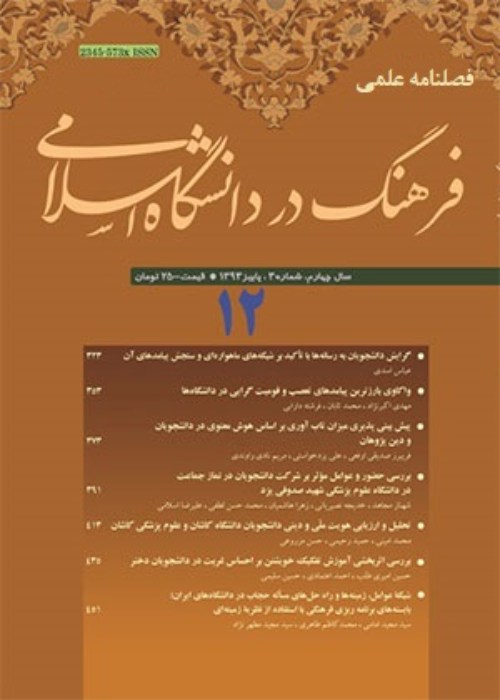A Study of Situations and Obstacles of Educational Elements of Islamic Citizenship in University (Case Study: University of Mazandaran)
Author(s):
Abstract:
Objectives
The aim of this article is to assess educational elements of Islamic citizenship in university based upon the text of Nahjo-al-ballaghe, by which it tries to determine the obstacles which universities are facing in order to fulfill this. Method
The method of study is quantitative (descriptive) and qualitative. The statistical society of study is consisted of two groups (professors and students) and the statistical sample of students is chosen from 234 students by applying the Cochran formula and also by using classes-based sampling divided by sex, faculty and stage. The equipment of study is a questionnaire which is provided by researchers and by studying the available sources. The stability of questionnaire is evaluated by Cronbach alpha and in order to study the content and form stabilities of the study, firstly, the mapping table of study’s questions was given to professors and experts and after the necessary modifying, the final form of questionnaire was produced. Among professors by applying the method of chained sampling, 10 persons of them was chosen in order to respond to the third question of the study and the data is gathered by semi-structured interview. Results
The results indicate that in students’ viewpoints the attention to elements of Islamic citizenship in university is below the average regarding political, economical and social aspects; nevertheless, the elements regarding moral aspect is above the average. Although, regarding statistical data of the latter aspect, similarly the other aspects of Islamic citizenship, was not meaningful. And also the results revealed through the interviews with professors show that the obstacles of fulfilling of Islamic citizenship lied in three administrative domains: external environment, structure and policies, administrators, efficient human resources, cultural: cultural plans, human resources, university’s environment and educational: Ministry of Science programs, course content, student-teacher interaction. Conclusion
The authors of the article conclude in general universities haven’t fulfilled Islamic citizenship and didn’t have any practically clear program in order to fulfill Islamic citizenshipKeywords:
education , citizenship , islam , university , obstacles
Language:
Persian
Published:
Irainian Journal of Culture in The Islamic University, Volume:5 Issue: 2, 2015
Pages:
273 to 294
magiran.com/p1478955
دانلود و مطالعه متن این مقاله با یکی از روشهای زیر امکان پذیر است:
اشتراک شخصی
با عضویت و پرداخت آنلاین حق اشتراک یکساله به مبلغ 1,390,000ريال میتوانید 70 عنوان مطلب دانلود کنید!
اشتراک سازمانی
به کتابخانه دانشگاه یا محل کار خود پیشنهاد کنید تا اشتراک سازمانی این پایگاه را برای دسترسی نامحدود همه کاربران به متن مطالب تهیه نمایند!
توجه!
- حق عضویت دریافتی صرف حمایت از نشریات عضو و نگهداری، تکمیل و توسعه مگیران میشود.
- پرداخت حق اشتراک و دانلود مقالات اجازه بازنشر آن در سایر رسانههای چاپی و دیجیتال را به کاربر نمیدهد.
In order to view content subscription is required
Personal subscription
Subscribe magiran.com for 70 € euros via PayPal and download 70 articles during a year.
Organization subscription
Please contact us to subscribe your university or library for unlimited access!



